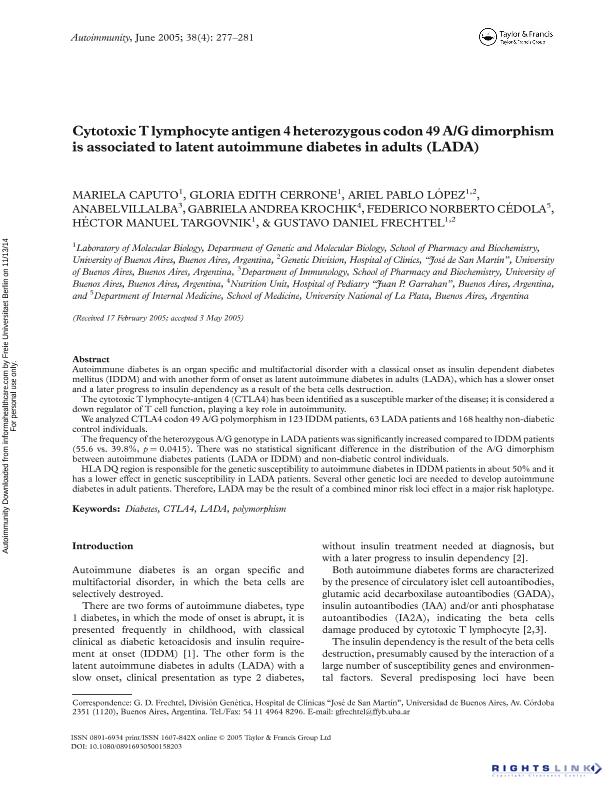Artículo
Cytotoxic T lymphocyte antigen 4 heterozygous codon 49 A/G dimorphism is associated to latent autoimmune diabetes in adults (LADA)
Caputo, Mariela ; Cerrone, Gloria Edith; Lopez, Ariel Pablo; Villalba, Anabel; Krochik, Andrea Gabriela; Cédola, Federico Norberto; Targovnik, Hector Manuel
; Cerrone, Gloria Edith; Lopez, Ariel Pablo; Villalba, Anabel; Krochik, Andrea Gabriela; Cédola, Federico Norberto; Targovnik, Hector Manuel ; Frechtel, Gustavo Daniel
; Frechtel, Gustavo Daniel
 ; Cerrone, Gloria Edith; Lopez, Ariel Pablo; Villalba, Anabel; Krochik, Andrea Gabriela; Cédola, Federico Norberto; Targovnik, Hector Manuel
; Cerrone, Gloria Edith; Lopez, Ariel Pablo; Villalba, Anabel; Krochik, Andrea Gabriela; Cédola, Federico Norberto; Targovnik, Hector Manuel ; Frechtel, Gustavo Daniel
; Frechtel, Gustavo Daniel
Fecha de publicación:
06/2005
Editorial:
Taylor & Francis Ltd
Revista:
Autoimmunity
ISSN:
0891-6934
Idioma:
Inglés
Tipo de recurso:
Artículo publicado
Clasificación temática:
Resumen
Autoimmune diabetes is an organ specific and multifactorial disorder with a classical onset as insulin dependent diabetes mellitus (IDDM) and with another form of onset as latent autoimmune diabetes in adults (LADA), which has a slower onset and a later progress to insulin dependency as a result of the beta cells destruction. The cytotoxic T lymphocyte-antigen 4 (CTLA4) has been identified as a susceptible marker of the disease; it is considered a down regulator of T cell function, playing a key role in autoimmunity. We analyzed CTLA4 codon 49 A/G polymorphism in 123 IDDM patients, 63 LADA patients and 168 healthy non-diabetic control individuals. The frequency of the heterozygous A/G genotype in LADA patients was significantly increased compared to IDDM patients (55.6 vs. 39.8%, p = 0.0415). There was no statistical significant difference in the distribution of the A/G dimorphism between autoimmune diabetes patients (LADA or IDDM) and non-diabetic control individuals. HLA DQ region is responsible for the genetic susceptibility to autoimmune diabetes in IDDM patients in about 50% and it has a lower effect in genetic susceptibility in LADA patients. Several other genetic loci are needed to develop autoimmune diabetes in adult patients. Therefore, LADA may be the result of a combined minor risk loci effect in a major risk haplotype.
Palabras clave:
CTLA4
,
DIABETES
,
LADA
,
POLYMORPHISM
Archivos asociados
Licencia
Identificadores
Colecciones
Articulos(INIGEM)
Articulos de INSTITUTO DE INMUNOLOGIA, GENETICA Y METABOLISMO
Articulos de INSTITUTO DE INMUNOLOGIA, GENETICA Y METABOLISMO
Citación
Caputo, Mariela; Cerrone, Gloria Edith; Lopez, Ariel Pablo; Villalba, Anabel; Krochik, Andrea Gabriela; et al.; Cytotoxic T lymphocyte antigen 4 heterozygous codon 49 A/G dimorphism is associated to latent autoimmune diabetes in adults (LADA); Taylor & Francis Ltd; Autoimmunity; 38; 4; 6-2005; 277-281
Compartir
Altmétricas



